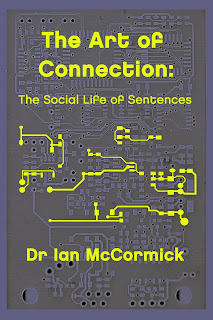Sentence Connection and Transition: a bibliography

Today I am sharing the FURTHER READING list published in my book The Art of Connection: the Social Life of Sentences (Quibble Academic 2013): Amidon, Arlene. "Children's understanding of sentences with contingent relations: Why are temporal and conditional connectives so difficult?" Journal of Experimental Child Psychology 22.3 (1976): 423-437. Astington, Janet Wilde, Janette Pelletier, and Bruce Homer. "Theory of mind and epistemological development: The relation between children's second-order false-belief understanding and their ability to reason about evidence." New Ideas in Psychology 20.2 (2002): 131-144. Bakewell, Sarah. How to Live: A Life of Montaigne in one question and twenty attempts at an answer . Vintage, 2011. Baker, Linda. "Comprehension monitoring: Identifying and coping with text confusions." Journal of Literacy Research 11.4 (1979): 365-374. Bates, Elisabeth, Philip S. Dale, and Donna Thal. &quo


